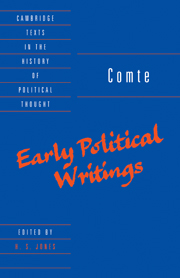Book contents
- Frontmatter
- Contents
- Introduction
- Notes on text and translation
- Chronology
- Biographical notes
- Bibliographical note
- 1 General Separation between Opinions and Desires
- 2 Summary Appraisal of the General Character of Modern History
- 3 Plan of the Scientific Work Necessary for the Reorganization of Society
- 4 Philosophical Considerations on the Sciences and Scientists
- 5 Considerations on the Spiritual Power
- 6 Examination of Broussais's Treatise on Irritation
- Index of names
- Index of subjects
- More titles in the Cambridge Texts in the History of Political Thought series
6 - Examination of Broussais's Treatise on Irritation
Published online by Cambridge University Press: 05 June 2012
- Frontmatter
- Contents
- Introduction
- Notes on text and translation
- Chronology
- Biographical notes
- Bibliographical note
- 1 General Separation between Opinions and Desires
- 2 Summary Appraisal of the General Character of Modern History
- 3 Plan of the Scientific Work Necessary for the Reorganization of Society
- 4 Philosophical Considerations on the Sciences and Scientists
- 5 Considerations on the Spiritual Power
- 6 Examination of Broussais's Treatise on Irritation
- Index of names
- Index of subjects
- More titles in the Cambridge Texts in the History of Political Thought series
Summary
Since the end of the sixteenth century, the human mind has experienced a general and continuous revolution whose object has been the gradual and total recasting of the entire system of human knowledge, which is henceforth to be built upon its true foundations, observation and reasoning. This fundamental revolution, prepared by the successive works of all previous centuries, especially from the Arabs on, was definitively caused and immediately begun by the great new impetus simultaneously imparted to human reason by Descartes's ideas, Bacon's precepts and Galileo's discoveries. Since that memorable time, the human mind, in all the branches of its knowledge, has constantly tended more and more to liberate itself completely and for ever from the dominance previously exercised by theology and metaphysics, completely to subordinate imagination to observation; in a word, to constitute the definitive system of positive philosophy.
The different branches of human knowledge have not all participated at the same speed in this important renovation. They had to undergo it in turn, according to the degree of complexity and of mutual dependence of the phenomena they consider. Physiology, being of all the parts of natural philosophy the one which studies the most complicated and the least independent phenomena, necessarily had to remain longer than any other under the yoke of theological fictions and metaphysical abstractions.
- Type
- Chapter
- Information
- Comte: Early Political Writings , pp. 228 - 240Publisher: Cambridge University PressPrint publication year: 1998



